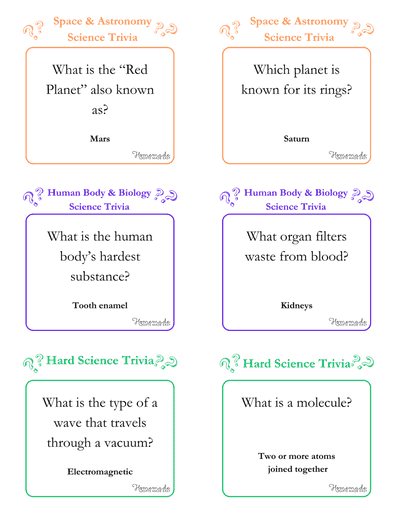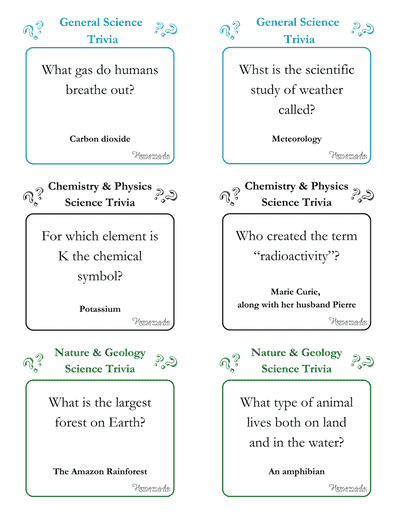120 Best Science Trivia Questions
Get your neurons firing with some brain-tickling science trivia! 🔍
Last updated: August 25, 2025 by Amanda
I remember loving science at school, because it is so diverse. Science covers nearly every single aspect of our lives and the world (and universe) around us! If you have little budding Einsteins at home, you should totally set up a fun family science trivia night with our science trivia questions.

We have broken down 120 questions into categories, making it easy to pick the right questions for you and your quiz-mates.
Science fact or fiction? Let's experiment with your knowledge!
Science Trivia Questions
Are you ready to begin? Use the navigation below to jump to the section that appeals to you, or keep scrolling to see all of our trivia questions for kids!
General | Easy | Hard | Human Body | Space | Nature | Chemistry & Physics
Want to play? Download our Printable Science Trivia cards.
Get a Random Science Trivia Question
For anyone who thinks that it's cheating to choose your own trivia question, click below!
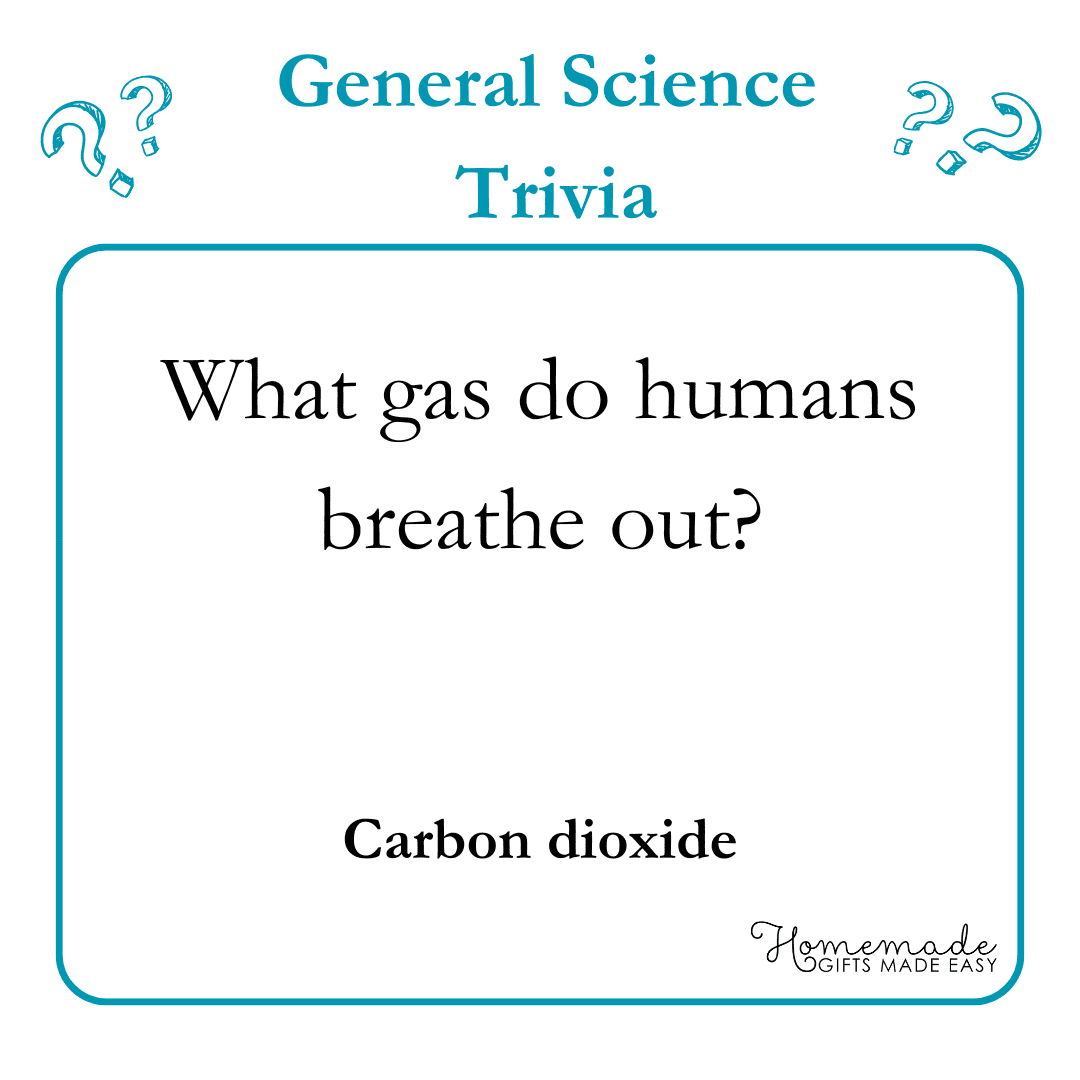
General Science Trivia Questions
These general science trivia questions are the pick of the bunch. From the animal kingdom, to outer space, it covers so many aspects of science: biology, chemistry, physics, astronomy and more!
Q: What is Saturn made of?
A: Gas and ice
Q: What is “melting point”?
A: The temperature at which a solid turns into a liquid
Q: What is N2O?
A: Nitrous Oxide
Q: Why does an apple fall to the ground when you let go of it?
A: Because of gravity
Q: What is the smallest bone in the human body?
A: Stapes (found in the ear)
Q: What mineral is used to make glass?
A: Silica
Q: What is the scientific study of weather called?
A: Meteorology
Q: What are all the planets, other than Earth, named after?
A: Roman gods

Q: What space probe reached the outer solar system?
A: Voyager 1
Q: What part of the brain controls balance and coordination?
A: The Cerebellum
Q: What is the scientific name for the study of animals known as?
A: Zoology
Q: What is the “Richter scale” used to measure?
A: Magnitude/size of an earthquake
Q: What gas do humans breathe out?
A: Carbon Dioxide
Q: What was the first manmade satellite to orbit Earth?
A: Sputnik 1
Q: What is a hill with a flat top and steep sides known as?
A: Plateau
Q: What is the smallest bird in the world?
A: The Bee Hummingbird

Easy Science Trivia Questions for Kids
There’s no need for a lab coat to answer these easy-peasy questions! Perfect for science rookies or if you want to warm up your brain, these easy science trivia questions will get you started.
Q: What is the main gas that humans need to breathe?
A: Oxygen
Q: How many legs does a spider have?
A: Eight
Q: What is a Tsunami?
A: A series of enormous ocean waves (usually caused by underwater earthquakes, volcanic eruptions, or landslides)
Q: What is the largest mammal?
A: The Blue Whale
Q: What organ allows humans to breathe?
A: Lungs
Q: What is the smallest planet in our solar system?
A: Mercury
Q: What force keeps our feet on the ground?
A: Gravity
Q: What is the largest sandy desert in the world?
A: The Sahara
Q: What color are a ladybug’s spots?
A: Black
Q: How many Earths (approximately) can fit inside the Sun?
A: Over one million
Q: Name the 5 oceans on Earth?
A: The Pacific Ocean, Atlantic Ocean, Indian Ocean, Arctic Ocean, and Southern Ocean
Q: What do you call a baby frog?
A: A Tadpole

Q: What is the largest organ in the human body?
A: Skin
Q: What is a scientist who studies dinosaurs called?
A: A Paleontologist
Q: What is the closest star to Earth?
A: The Sun
Q: What do caterpillars turn into?
A: Butterflies
Q: What do bees collect from flowers?
A: Nectar
Q: What organ pumps blood throughout the human body?
A: Heart
Q: What are the three primary colors?
A: Red, yellow, and blue
Q: Which sense uses your nose?
A: Smell
Q: Which animal can change its skin color to match its surroundings?
A: Chameleon
Q: What is the name of the layer of air surrounding Earth?
A: Atmosphere
Q: How many chambers does the human heart have?
A: Four
Q: What is the freezing point of water in Celsius?
A: 0 degrees
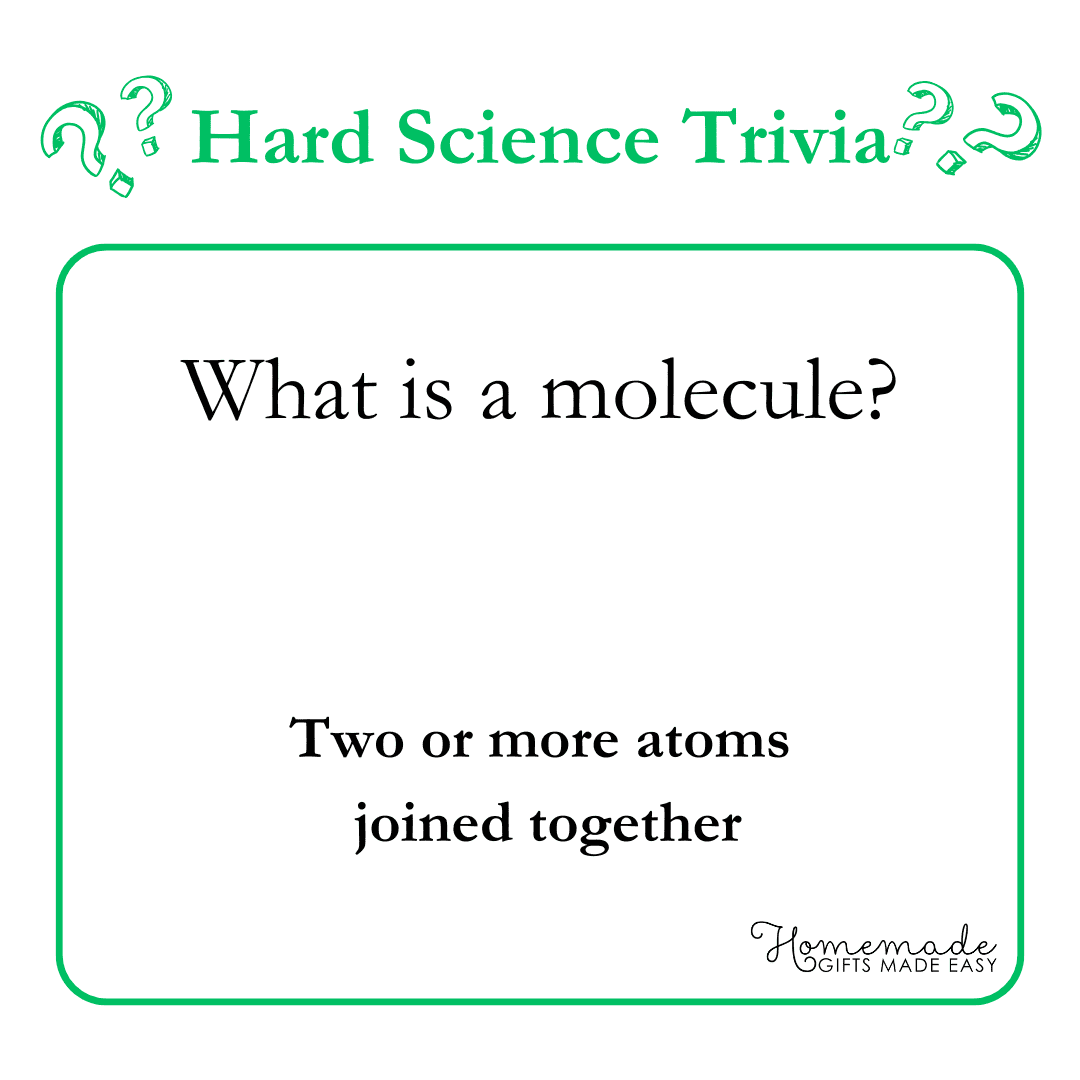
Hard Science Trivia Questions
Think you're a science whiz? These hard science trivia questions will put your knowledge under the microscope! Let's give your brain cells a workout with these science stumpers.
Q: What is a G-force?
A: The measure of acceleration experienced by an object, typically due to gravity
Q: What is the longest-living vertebrate animal?
A: The Greenland shark. With an average lifespan of 250 years, they can reach over 500 years old!
Q: What is pH?
A: The measure of the acidity or alkalinity of a substance
Q: What are hurricanes called in Australia?
A: Tropical Cyclones
Q: What is an invertebrate?
A: An animals with no backbone or internal skeleton
Q: What is the green pigment in plants that absorbs light for photosynthesis?
A: Chlorophyll
Q: What is DNA?
A: Deoxyribonucleic Acid, or the genetic material found in living organisms
Q: What is a molecule?
A: Two or more atoms joined together
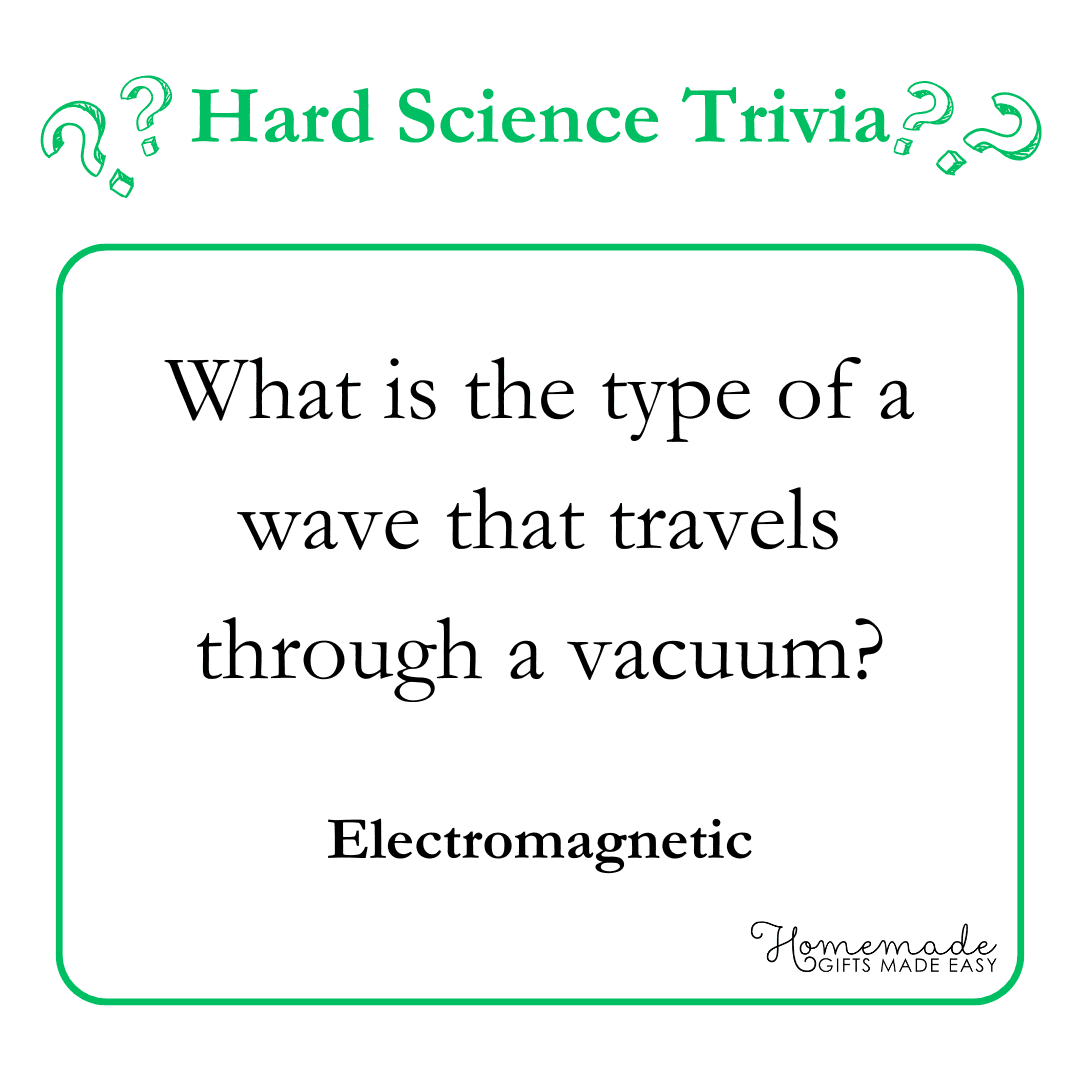
Q: What does a koala eat?
A: Eucalyptus leaves
Q: What is an igneous rock?
A: A rock formed from the cooling and solidification of magma/lava
Q: What is the strongest muscle in the human body?
A: The Masseter (or jaw muscle)
Q: What is an aquifer?
A: An underground layer of rock/sediment that holds water
Q: What type of wave travels through a vacuum?
A: Electromagnetic
Q: What is diffusion?
A: The movement of molecules from a region of high concentration to a region of low concentration
Q: What is the deepest part of the ocean called?
A: The Mariana Trench
Q: What rocks are used to make concrete?
A: Aggregates including gravel, crushed stone, and limestone

Human Body & Biology Science Trivia Questions
I've got a gut feeling you're going to love these fun and hair-raising human body and biology trivia questions.
Q: What is the colored part of the eye?
A: Iris
Q: How many bones are in a human body?
A: 206
Q: What do white blood cells do?
A: Fight infections
Q: What organ filters waste from blood?
A: Kidneys

Q: What is the strongest bone in the human body?
A: The Femur / Thigh Bone (It’s stronger than concrete!)
Q: What is the largest part of the brain called?
A: The Cerebrum
Q: What connects muscles to bones?
A: Tendons
Q: What is the human body’s hardest substance?
A: Tooth Enamel
Q: What is the smallest unit of life?
A: A Cell
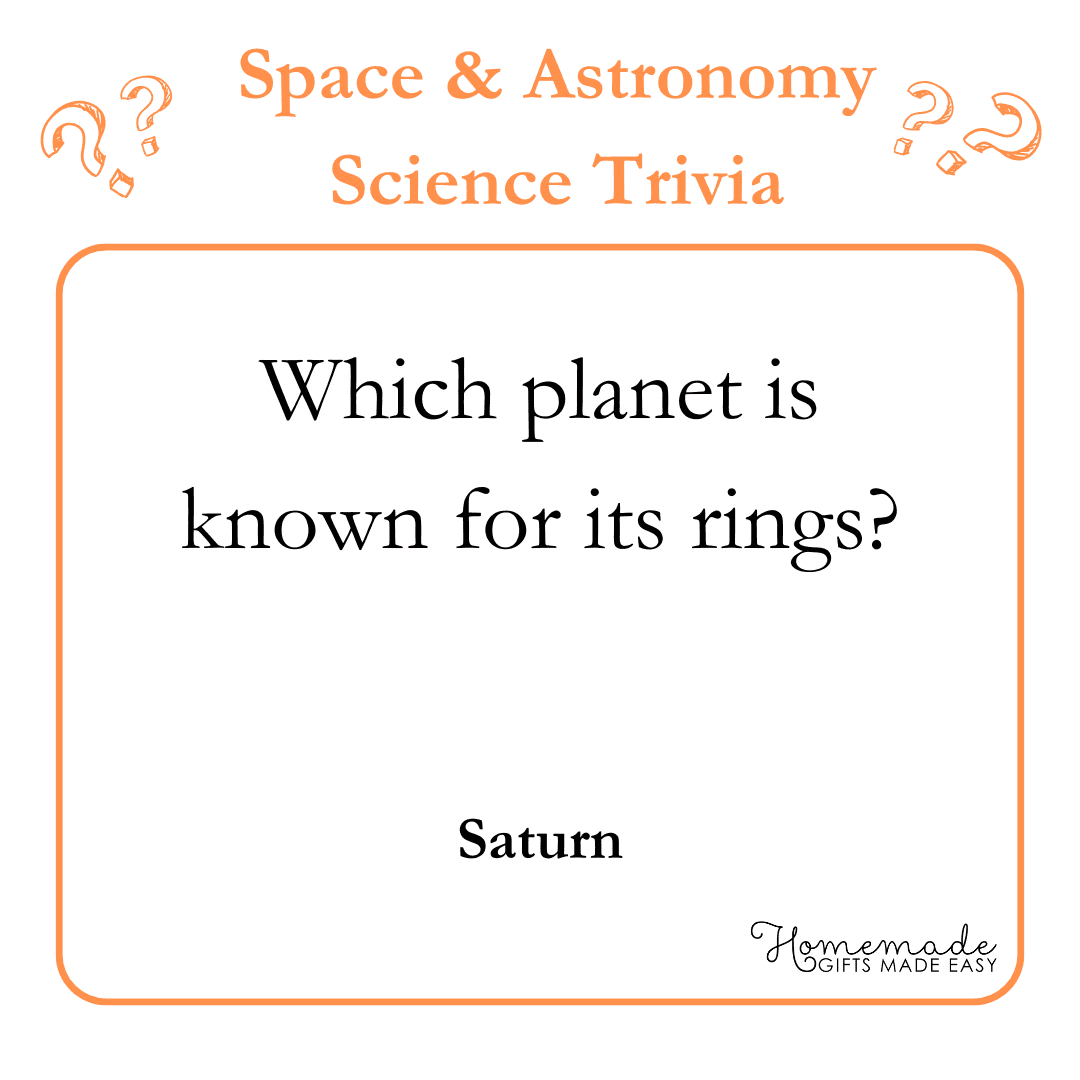
Space & Astronomy Science Trivia Questions
Houston, we have some questions! 3...2...1...blast off into these out-of-this-world space trivia questions. These astronomy science trivia questions are sure to challenge young and old.
Q: Which planet is found closest to the sun?
A: Mercury
Q: What is the name of our galaxy?
A: The Milky Way
Q: Who was the first human to walk on the moon?
A: Neil Armstrong
Q: Which planet is known for its rings?
A: Saturn
Q: What do you call a group of stars that forms a pattern?
A: A Constellation
Q: What is a large eruption of energy from the Sun called?
A: A Solar Flare
Q: What country was the first to launch a satellite into orbit?
A: The Soviet Union
Q: In what year did the first space shuttle launch?
A: 1981
Q: What company is behind the Starlink satellite constellation?
A: SpaceX
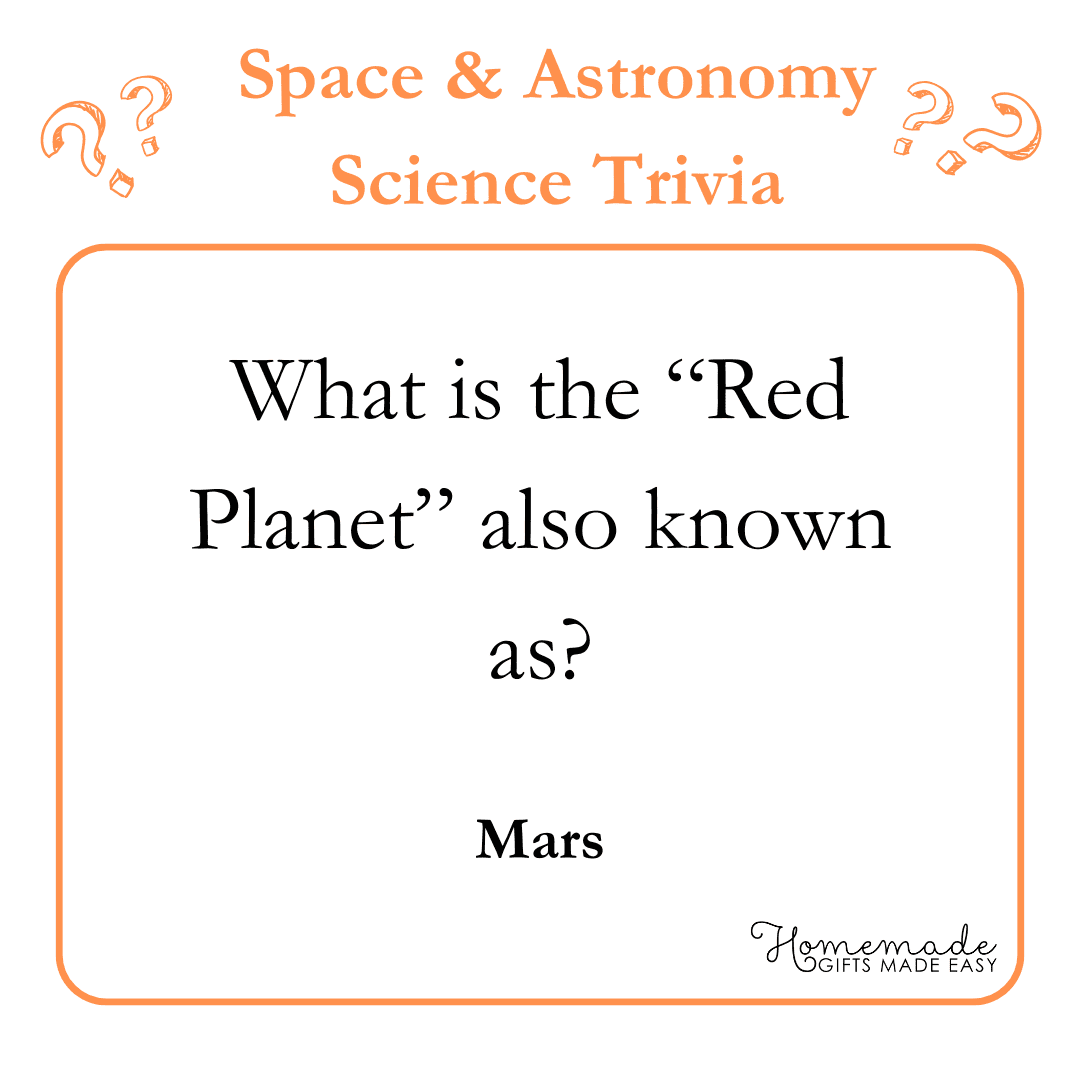
Q: Is the Sun a planet?
A: No, it is a star
Q: What is the Moon's distance from Earth, on average?
A: 238,855 miles / 384,400 km
Q: What is the “Red Planet” also known as?
A: Mars
Q: Approximately, what is the speed of a space shuttle while in orbit?
A: 17,500 miles per hour / 28,160 km per hour.
Q: In 2025, what pop singer was launched into space?
A: Katy Perry
Q: How many moons does Mars have?
A: Two
Q: What is created when a star collapses under its own gravity?
A: A Black Hole
Q: Which planet is nicknamed the "Morning Star" or "Evening Star"?
A: Venus
Q: Who famously said “Houston, we've had a problem"?
A: Astronaut John "Jack" Swigert (Apollo 13 mission)
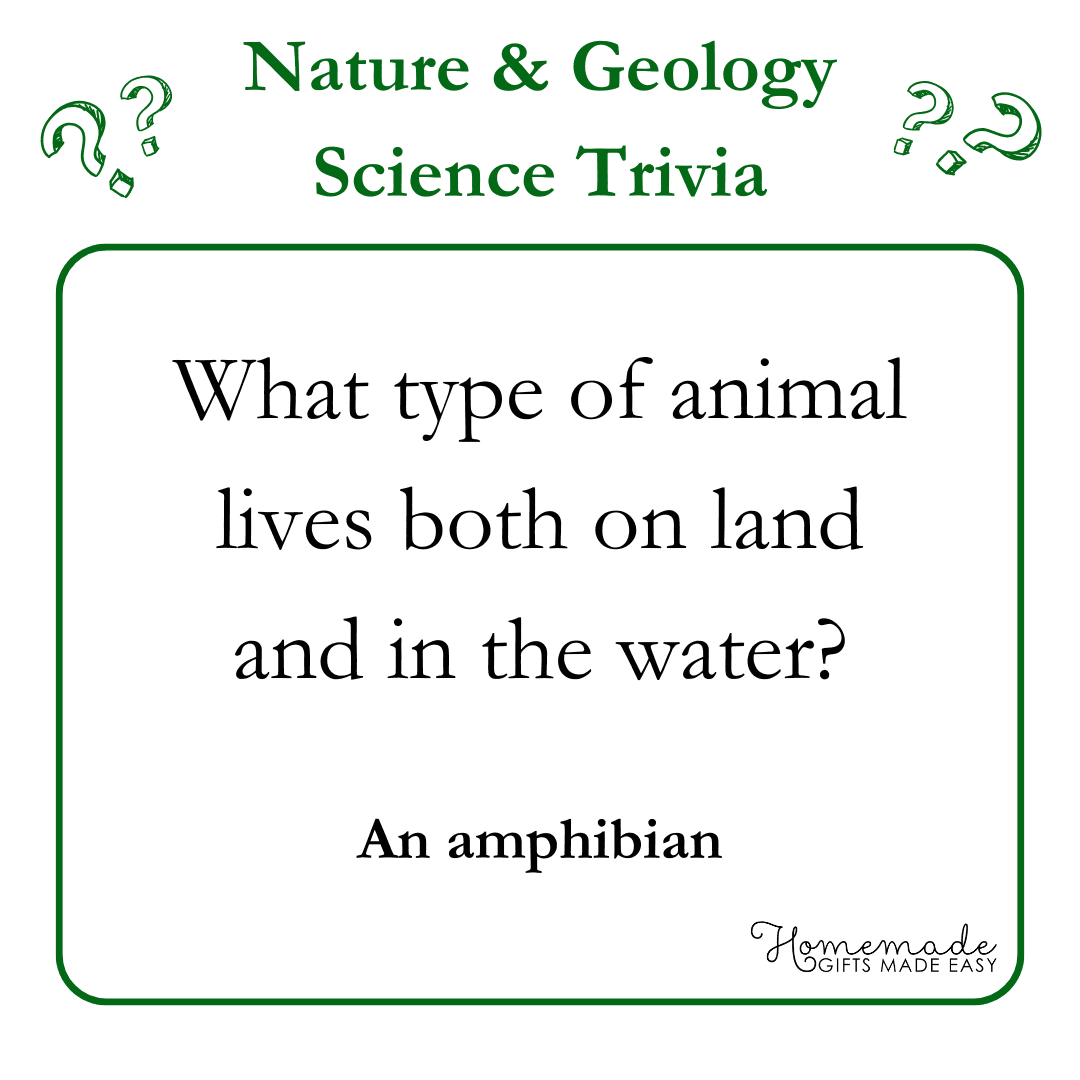
Nature & Geology Science Trivia Questions
Let's branch out with these nature and geology science trivia questions. From nature, to animals and the world around us, there’s so much to learn about on our big, green and blue planet!
Q: What is precipitation?
A: Water falling from the sky (e.g. rain, snow etc)
Q: What is an omnivore?
A: An animal that eats both plants and meat
Q: How many colors are in a rainbow?
A: Seven
Q: What do you call a baby deer?
A: A Fawn
Q: What color is a giraffe’s tongue?
A: Purple
Q: Which is it called when water turns into vapor?
A: Evaporation
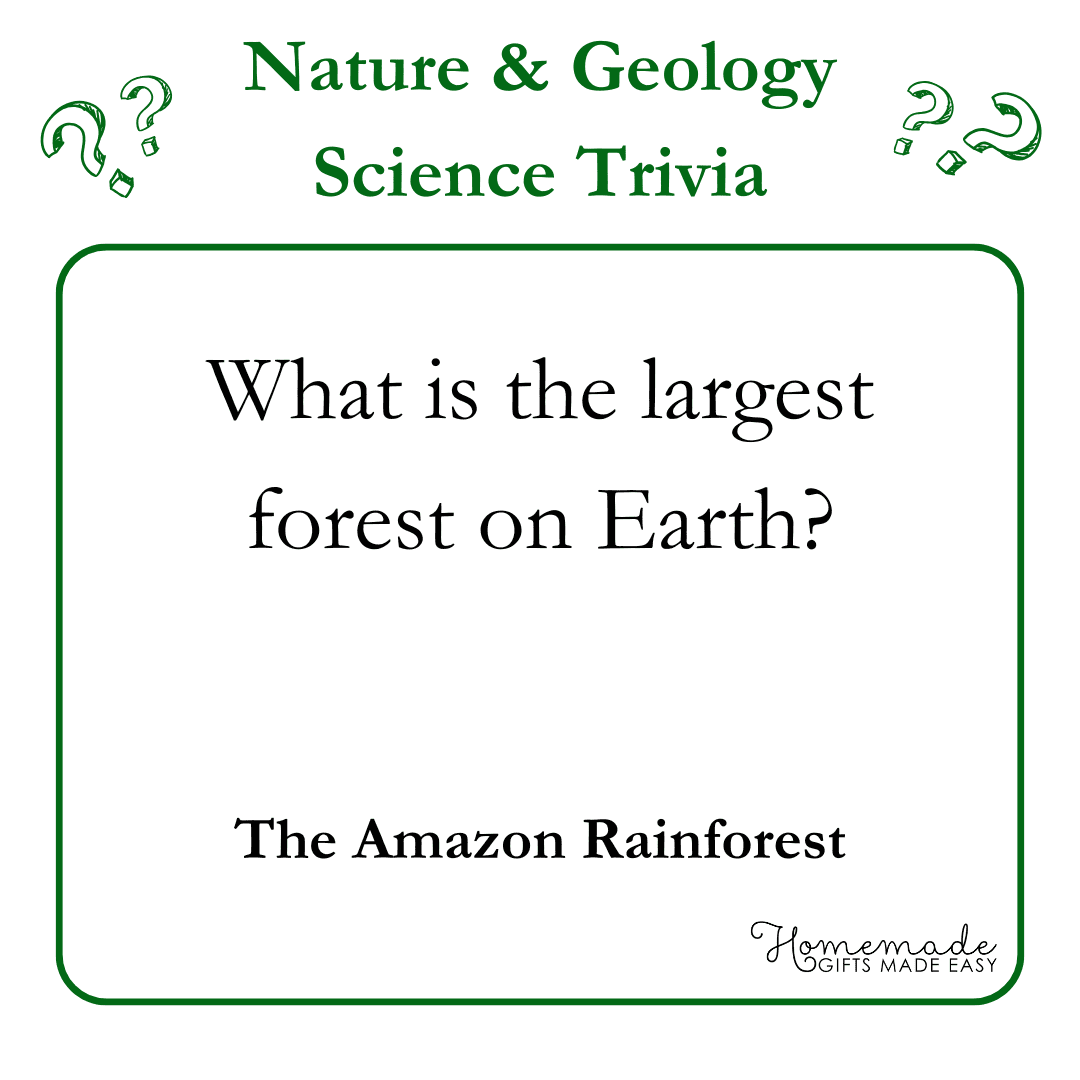
Q: What type of animal lives both on land and in the water?
A: An Amphibian
Q: What is the molten rock that erupts from a volcano?
A: Lava
Q: Which mammal is the slowest?
A: Three-toed Sloth
Q: What is the hardest natural substance found on Earth?
A: Diamond
Q: What are the three main types of rocks?
A: Sedimentary, Metamorphic, and Igneous
Q: What is a glacier?
A: A large moving mass of ice
Q: What is the process by which a caterpillar turns into a butterfly?
A: Metamorphosis
Q: How does an earthquake happen?
A: Through a release of stress within the Earth's crust, usually where tectonic plates meet
Q: What rock is nicknamed "fool's gold"?
A: Pyrite or Iron Pyrite
Q: What is the largest forest on Earth?
A: The Amazon Rainforest

Chemistry & Physics Science Trivia Questions
Get your brains buzzing with our chemistry and physics trivia questions! These questions are a great way to test your knowledge of everything from atoms to Einstein. Let's see how well you know these scientific facts.
Q: What is the middle of an atom called?
A: A Nucleus
Q: Who discovered gravity?
A: Isaac Newton
Q: What is NaCl?
A: Salt
Q: What is an atom?
A: The smallest unit of an element
Q: What is boiling point?
A: The temperature at which a liquid turns into a gas
Q: What is the name of the force that makes objects float in water?
A: Buoyancy
Q: What is the opposite of a conductor of electricity?
A: An Insulator
Q: Who created the term “radioactivity”?
A: Marie Curie, along with her husband Pierre

Q: In which country was Albert Einstein born?
A: Germany
Q: Name the first element on the periodic table?
A: Hydrogen (H)
Q: How long does it take for the sun’s rays to reach Earth?
A: 8 minutes
Q: For which element is K the chemical symbol?
A: Potassium
Q: What is the chemical reaction where a nucleus of an atom splits?
A: Nuclear Fission
Q: What are the three states of matter called?
A: Gas, Liquid, and Solid
Q: Who discovered electricity?
A: Benjamin Franklin
Q: What is the disease-causing thing that can be killed by antibiotics?
A: Bacteria
Q: What is the boiling point of water?
A: 212 degrees fahrenheit / 100 degrees celsius
Q: What gas is made when acids react with metals?
A: Hydrogen
Q: What is the shape of DNA called?
A: Double helix
Printable Science Trivia Cards (Free PDF)
Ready to play? Download our free printable science trivia game cards.
These printables are for personal, non-commercial use only.
Keep the Fun Going!
If our science trivia questions left you wanting more, you're in for a treat. Let the games continue!
- Trivia Questions
- Trivia Questions for Kids
- History Trivia Questions
- Geography Trivia
- Animal Trivia
- Riddles
- Riddles for Kids
- Riddles for Adults
- Fun Multiple Choice Questions
- Brain Teasers
- Printable Word Search Puzzles
